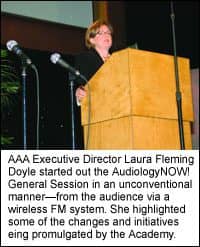 |
|
RNID’s Don’t Lose the Music squad tested Cardiff shoppers’ MP3 players in November |
The Royal National Institute for the Deaf (RNID), London, is urging music lovers who receive MP3 players as holiday gifts to use them responsibly so they can enjoy their favorite music for years to come.
The charity has reported the results of its largest UK-wide field research, showing 66% of surveyed MP3 users are listening to louder than 85 decibels which, according to the World Health Organization, can cause permanent damage to hearing over time. When the cumulative effects of loud music at festive parties, bars, and clubs are added to an individual’s weekly dose of high volumes, the listeners risk premature hearing damage, the charity warns.
"Our research found people around the country are listening to their MP3 players at unbelievably high levels, with more than one in five blasting their ears with sound levels of 100 decibels or more – the equivalent of hearing a pneumatic drill 10 feet away!" says Emma Harrison, RNID’s director of external affairs. "One MP3 user was listening at 118 decibels for 1 hour each day, a volume they shouldn’t be exposed to for more than 11 seconds per day."
The charity’s Don’t Lose the Music squad toured eight cities across the UK to spot-check the volume of 246 shoppers’ MP3 players. The research also found that 54% of MP3 player users tested are risking permanent hearing damage by listening to their devices at dangerously high volumes for longer than the recommended daily exposure limit.
Many music lovers, already running the risk of damage through listening to their MP3 players too highly, will be partying to even more loud music during the festive season, completely oblivious to the danger to their hearing, Harrison says.
RNID’s findings support a recent European Commission review, which confirmed that listening to personal music players at a high volume over a sustained period can lead to permanent hearing damage. Research by the EU Scientific Committee on Emerging and Newly Identified Health Risks found that 5 to 10% of personal music player listeners risk permanent hearing loss if they listen to a personal music player at sound levels exceeding 89 decibels for more than 1 hour per day each week for 5 years.
The organization, which represents the UK’s 9 million people who are deaf or hard of hearing, is urging music lovers to follow these guidelines for safer listening:
- Take a 5-minute rest for every hour you listen to your MP3 player to allow ears to recover.
- If you crank up the volume on noisy trains or busy streets, invest in noise-cancelling or sound-isolating headphones that cut out background noise.
- Remember that even a small change in volume can have a big effect.Stand away from loud speakers in pubs, clubs, gigs and concerts.
- Take regular breaks from the dance floor and use chill out areas to give ears a rest from loud music.
- Wear earplugs designed for use in clubs and gigs, which reduce the volume not the quality of the sound – available for the price of a CD.
Field research conducted by RNID during 2008 among 246 participants in Edinburgh, Newcastle, Bristol, London, Leeds, Belfast, Plymouth and Cardiff found:
- 163 people – 66% of those tested – were listening at more than 85 decibels
- 53 people – 22% of those tested – were listening at more than 100 decibels
- 132 people – 54% of those tested – are risking permanent hearing damage by listening to their devices at dangerously high volumes for longer than the recommended daily exposure limit
Don’t Lose the Music is supported by musicians and celebrities such as Moby, Embrace, Katie Melua, Bloc Party, Eddy Temple-Morris (Xfm), KT Tunstall, Sir George Martin, Lemar, Lou Rhodes, and Roger Daltrey.



